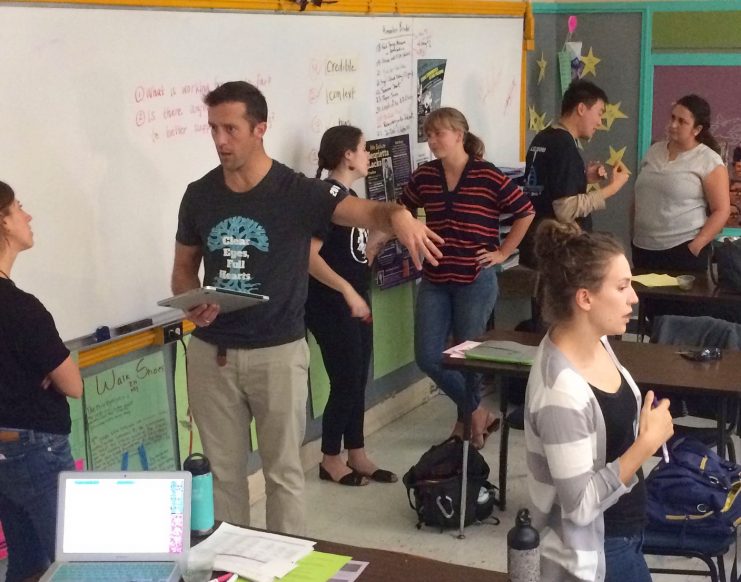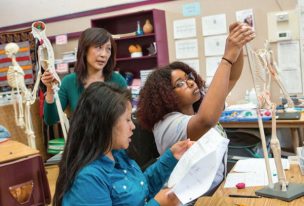
Spotlight on Life Academy, OUSD: Collaborative Inquiry Keeps Teachers in the Classroom
by Christi Carpenter and Marguerite Sheffer
This year, Mills Teacher Scholars supported teacher scholars from the Science and Humanities teams at Life Academy High School in Oakland in an initiative to increase teacher retention. With support from Educate78, which offers grants to Oakland schools aimed at increasing teacher retention, Mills Teacher Scholars Program Associate Jen Ahn supported teachers in moving through a year-long inquiry cycle. Together, the teachers decided that each of their classroom-based inquiries would connect to a shared department goal–supporting English Language Learners in the Humanities team, and students’ use of evidence in the Science team.
Each teacher pursued an inquiry focus unique to his or her classroom, and at monthly meetings the teachers had time to study student work and reflect together on their deepening understanding of how to improve their teaching.
As a result of their work:
- 40 of the 100 English Language Learners at Life improved in reading by multiple grade levels on the SRI (Scholastic Reading Inventory)
- 20 students were “reclassified,” meaning their English Language proficiency improved on measures including the CELDT.
- Along the way, Jen and the Life Academy teacher scholars developed a learning space that fostered collaborative inquiry and built teacher efficacy and leadership.
Through teacher-led, collaborative inquiry, in other words, they shaped and sustained the professional learning conditions that drive teacher retention.
Why Do Teachers Leave High-Poverty Schools? Why Do They Stay?
A common assumption is that teachers leave high-poverty schools because of the student population. Rather, studies show that teachers leave high-poverty schools because they feel isolated or because working conditions (poor leadership, bureaucratic policies, lack of safety or structure, level of teacher influence) make it hard to do their work.
Research also shows that the inverse conditions build teacher resilience, even in a challenging teaching job or high-poverty school. Teachers who engage in learning communities, as the Life teachers did through Mills Teacher Scholars, are more likely to be retained. These teachers experience a sense of efficacy,* a collaborative community, opportunities for leadership, and the time and space for inquiry into their practice.
Simon & Johnson (2013) give us a clue as to why these conditions work:
Participation in learning communities gives teachers an opportunity to work on a sustained basis with their colleagues, develop a sense of shared mission, and feel much more connected and committed to the school. These communities are especially good at helping beginning teachers build collegial relationships and navigate school norms and at reinvigorating and energizing more experienced teachers.
Supporting Teacher Retention at Life Academy
At monthly inquiry sessions at Life Academy, teachers worked in learning communities by:
- Choosing routine classroom practices to investigate
- Analyzing real-time, everyday, classroom-based data
- Adjusting and monitoring teacher practice to incorporate new, evidenced-based understandings
- Collaborating with colleagues in conversations focused on student learning
- Assuming responsibility for facilitating the learning of colleagues.
After the year of Mills Teacher Scholars inquiry work, Life Academy saw results for students, and also results for teachers:
- 40 of 100 English Language Learners improved in reading by multiple grade levels on the SRI (Scholastic Reading Inventory).
- 20 students improved their English Language proficiency on measures including the CELDT.
- 82% of Life Academy teachers who were asked to stay in their positions reported that they plan to teach at the site next year.
- 100% of teachers reported that they feel more comfortable receiving questions and feedback from colleagues that challenge their current thinking/ideas.
In end-of-the-year feedback, teacher scholars named the structured collaboration of inquiry as valuable:
- “Simply sitting and thinking about the data with colleagues is helpful.”
- “[I valued] working with teachers in other grade levels to see into their classrooms, work on aligning, and hear ideas from other teachers about how to adjust practice.”
- “ ‘Seeing’ into other teachers classrooms, the chance think through and aloud and with others.”
- “I think what was helpful was hearing colleagues asking similar questions even at different grade levels and across disciplines.”
This story is not unique to Life Academy.
The same teacher learning conditions that Mills Teacher Scholars supported at Life Academy–collaborative, teacher-driven inquiry–can be deliberately nurtured to decrease isolation and increase teacher collective efficacy at any school or district, pushing back against the teacher attrition crisis in Oakland and beyond.
*Ware and Kitsantas, 2007

